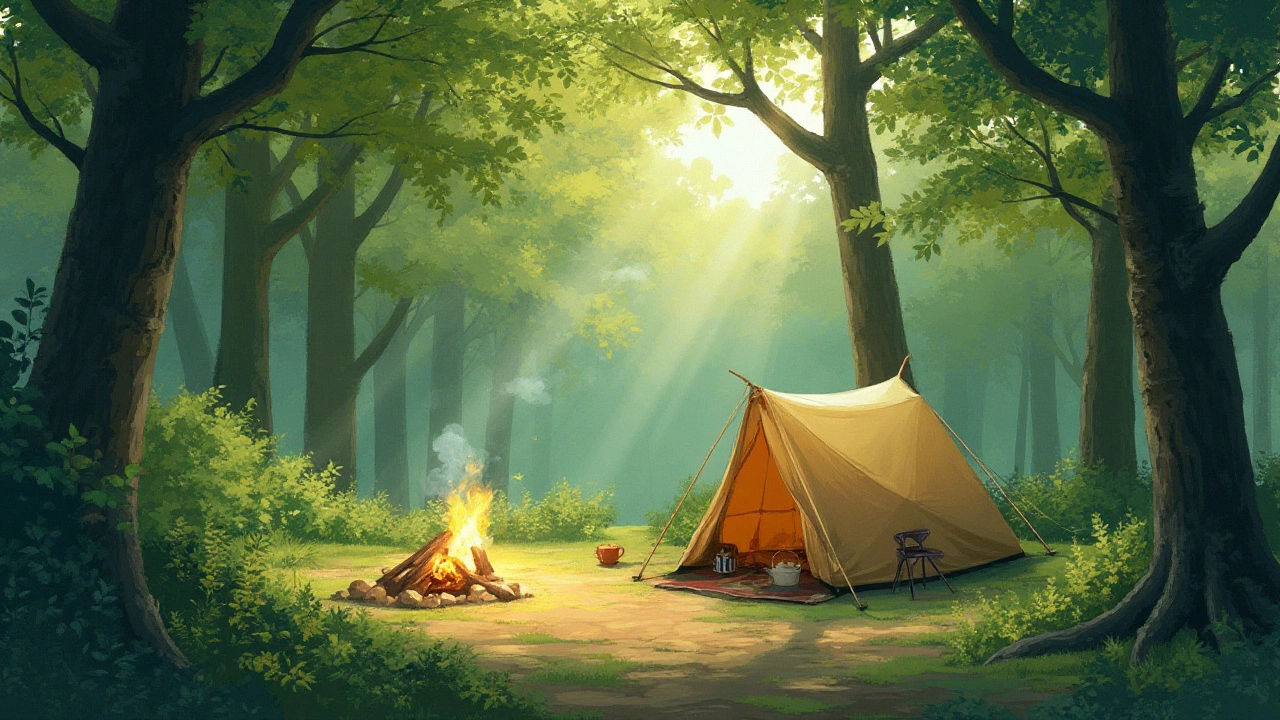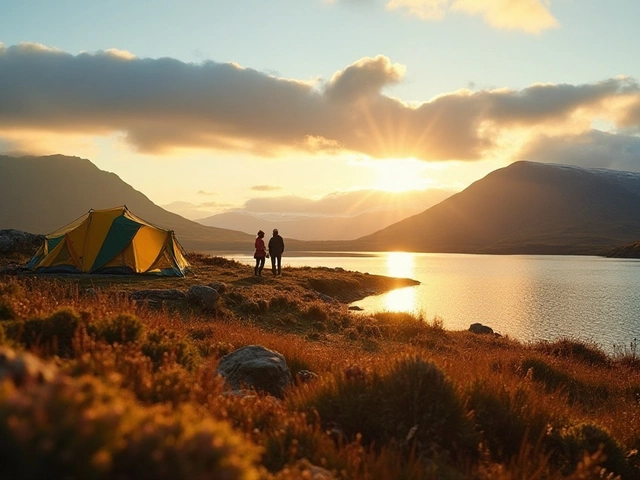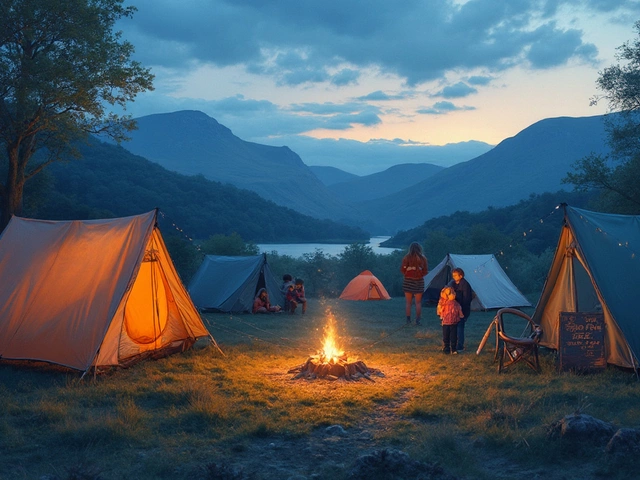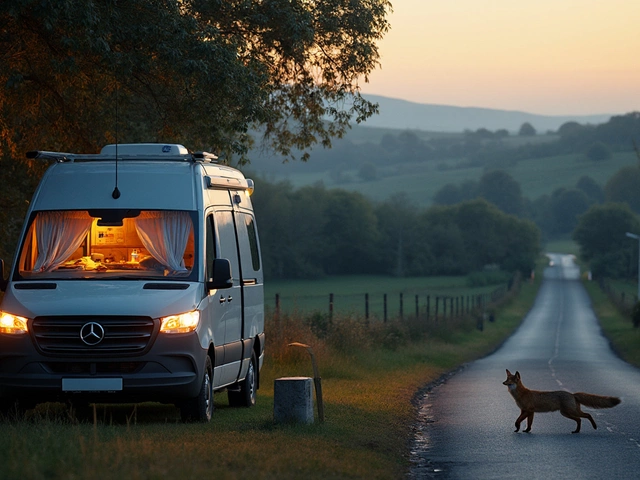When you step into the woods and take a deep breath in, it's more than just fresh air. It's a symphony of health benefits ready to embrace you. Forest camping opens up a world where the stress of daily life can be left behind, and the healing power of nature takes center stage.
Getting away from the hustle and bustle to spend nights under a canopy of stars, surrounded by the rustling leaves, can have profound effects on your well-being. The idea of unplugging becomes appealing, where smartphones and screens are replaced by the sights and sounds of the wilderness, offering a much-needed respite in our tech-driven lives.
Research has shown that being in nature can boost your mood, increase your energy levels, and even improve heart health. Whether you're hiking through trails, enjoying a tranquil fishing spot, or simply lounging by a campfire, the woods offer a variety of activities to keep the body and mind active. Discovering the secrets and beauty of a forest might just be the best medicine one can have.
- The Physical Health Boost from Forest Air
- Mental Well-Being and Nature
- Activities to Keep You Engaged
- Unplugging: Digital Detox in the Woods
- The Role of Forest Bathing
- Tips for a Safe and Enjoyable Camping Experience
The Physical Health Boost from Forest Air
Breathe deeply and let the crisp, invigorating air of the forest fill your lungs. There's something uniquely refreshing about being in a forest that's not just because you're out of the hustle and bustle of the city. Scientists have found that forests are brimming with phytoncides, those lovely aromatic compounds emitted by plants and trees. When inhaled, these natural chemicals bolster the human immune system by increasing the number and activity of a particular type of white blood cells known as natural killer (NK) cells.
These NK cells play a crucial role in attacking virus-infected cells and various forms of tumors, thus strengthening your body's defenses. In fact, one study conducted in Japan found that after spending time in a forest, the participants' NK cell activity increased significantly and continued to remain elevated for a considerable period, showcasing just how impactful a forest's embrace can be. Forest air is teeming with oxygen, essential for the optimal function of every cell in our bodies, contributing to improved cardiovascular health. The act of walking or hiking through these natural spaces also pumps up circulation, and can lower blood pressure, all while you are effortlessly immersed in nature's calming presence.
Apart from the immune boost, another delightful benefit of indulging in the great outdoors is the air filled with negative ions. These are known to enhance mood and relieve stress. When we breathe in these ions, they help us absorb more oxygen, leading to increased serotonin production, a neurotransmitter that improves mood and alleviates depression. A stroll through the forest can almost feel like nature's version of a serotonin shot.
"In every walk with nature one receives far more than he seeks," John Muir wisely pointed out, capturing the essence of finding health and solace in forests. Surrounded by all that green, each breath you take can feel like a nurturing hand that soothes the restless mind and invigorates the body. His words speak volumes about the hidden treasures within a woodland escape.With moments spent in the serene embrace of a forest, you allow yourself to step away from pollutants and intake air that's filtered by the natural environment, purer than what we are accustomed to in urban settings.
The Science Behind Forest Air
The Japanese concept of Shinrin-yoku, also known as forest bathing, has gained traction worldwide due to its host of healing properties. It's not about actual 'bathing' in water, but rather immersing oneself in the atmosphere of the forest, soaking in its essence. This practice has been scientifically linked to an array of physiological benefits. Studies report reductions in stress hormones such as cortisol, improved heart rate variability, and enhanced energy levels. Engaging with nature's raw beauty first-hand is an excellent way to foster well-being, a tangible boost to one’s mental clarity and physical resilience.
For those interested in specific numbers, a comparison of city air versus forest air reveals a striking difference in air quality. Particulate matter, tiny particles found in the air, are substantially lower in forests, allowing clearer, cleaner air intake—evidence backs up the rejuvenating qualities many of us feel when surrounded by towering trees and lush canopies.
Mental Well-Being and Nature
Spending time in the forest isn't only about soaking in serenity; it's also an essential strategy for nurturing our mental health. The presence of trees and the natural environment has been scientifically linked to reduced stress levels. When the mind is cluttered with the endless noise of urban life, being immersed in nature can work wonders, bringing about unparalleled tranquility. The very act of walking through the woods and engaging with the natural surroundings activates mechanisms in our brains that heighten concentration and imbue us with a sense of peace. With every step on a forest trail, the frequency of the heartbeat may stabilize and lead to a decrease in blood pressure, thanks to the interaction with nature's quiet harmonies.
The psychological benefits are well-documented. A study published in the Environmental Health and Preventive Medicine journal highlights that forest bathing, or "shinrin-yoku," significantly reduces cortisol concentrations, a marker of stress in the body. Many people find solace and therapeutic relief in the sights and sounds of the woods that are difficult to emulate elsewhere. Nature’s beauty can act as a muse, stirring creativity and providing a much-needed mental refresh. Engaging with the outdoor activities that come with forest camping, such as hiking or even just exploring a lakeside with a fishing pole, illuminates different aspects of our mental horizons. Those moments of awe in the wild forest contribute to a more profound sense of satisfaction and happiness.
Moreover, the color green, predominantly observed in forest settings, has its own soothing effect; it calms the mind by invoking a feeling of renewal and restoration. As the soft green hues work their magic on your mental framework, alignment begins with the body’s internal rhythm, promoting a unique state of relaxation. Social interactions in the woods, often devoid of city distractions like smartphones, allow campers to connect on deeper emotional levels through genuine conversation and group activities. This form of engagement promotes a sense of community and belonging, which is critical for emotional health. Sharing stories by a campfire, laughing freely, and swapping life experiences foster an invaluable sense of camaraderie that can be carried even after the camping trip.
"In every walk with nature, one receives far more than he seeks." — John Muir
To underline these benefits with some numbers, an analysis conducted by Stanford University researchers found that spending even a limited 90-minute walk in a natural area decreased activity in a region of the brain associated with a key factor in depression. These compelling statistics underscore the importance of finding regular intervals to leave the fast-paced digital world behind and reconnect with natural ecosystems that feed our spirit. In a forest, away from urban chaos, clarity and mindfulness begin to take root. Exploring these green paradises encourages full immersion into the present moment, helping block constant worries and fears to improve our overall emotional and psychological resilience.
Activities to Keep You Engaged
Being in a forest camping site means the world is your playground, and there is an abundance of activities to keep both body and spirit engaged. One such activity is hiking. Imagine taking paths adorned with a riot of green, listening to birds perform their symphonies while following trails that seem to lead through time. Hiking strengthens your heart and tones muscles, simultaneously enriching your soul with the beauty around you. If you time your visit right, seasonal wildflowers offer a feast for the eyes alongside the evergreen backdrop. For a more relaxed pace, consider strolling, absorbing every nuance of nature's whispers, and connecting with the serenity it provides.
Exploring these woods also offers a chance to engage in fishing — an age-old practice that challenges both patience and skill. Settle by a pristine lake or stream, rod in hand, and wait in quiet anticipation as morning sun patches ripple across the water. It’s a meditative exercise, punctuated with moments of excitement, when the line tugs and the day’s catch surfaces, gleaming and triumphant. Fishing not only contributes to physical activity but also provides a deeper appreciation for the delicate ecosystems around us. It’s an activity best enjoyed slowly, savoring each moment, whether successful or not.
At a site like this, engaging in a simple yet fulfilling pastime such as birdwatching can be particularly rewarding. With binoculars in hand, venture softly into the forest with eyes peeled and ears alert. Each sighting of a colorful, darting creature or the delightful tune it sings contributes to a deeper connection with nature. Besides identifying various species, you learn their behaviors, habitats, and the delicate balance they maintain in their ecosystem. Embracing such knowledge allows for a greater understanding of the intertwined lives within the canopy, planting seeds of responsibility toward conserving it.
"The clearest way into the Universe is through a forest wilderness." - John Muir
For those seeking artistic endeavors, try sketching or nature photography. Capturing moments through the lens or strokes can be immensely rewarding. These woods are a constant source of stunning inspiration, from morning mist draping the forest floors to the intricate textures of bark and leaf. The forest becomes both studio and gallery, and every visit as an artist unveils unique stories of color and form. This creative engagement ensures days spent in the forest result not only in memories etched in the mind but also keepsakes to cherish forever.
Evenings bring about a unique set of delightful activities. Setting up a campfire acts as a ceremonial pivot, drawing campers together to share stories, laughter, and warmth beneath a canopy pricked with stars. The crackle of wood, coupled with the soft murmur of leaves and calls of nocturnal wildlife, creates an ambiance that only nature can provide. Perhaps you'll find solace in journaling or simply reflect in the quieting dusk, both of which can be equally engaging and enriching. Such is the draw of spending time immersed in forest camping; opportunities to engage are as vast as the woods themselves.
Morning yoga amidst the dewy grass, or a gentle workout using whatever can be found — a fallen log, rocks, or clearing — fuels your body with energy to start the day. Nature, in its extravagance, doesn't offer the gym equipment we are used to, but its resources are abundant when cleverly utilized. Recognizing these opportunities invites adaptation and growth, showcasing how the forest is an adaptive instructor in varying lifestyles of health and fitness. Amidst all these activities, it's essential to focus on sustainable practices, ensuring the respect and preservation of these pristine spaces for future adventurers.
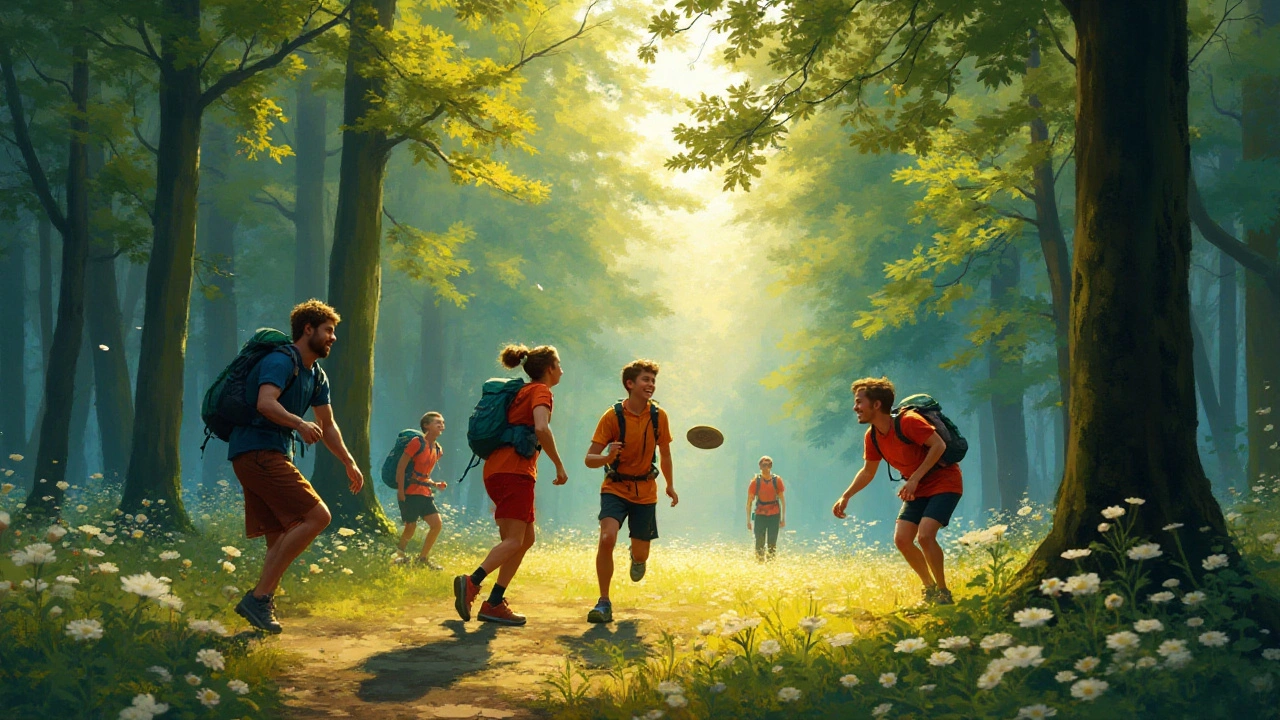
Unplugging: Digital Detox in the Woods
In this age of continuous notifications and relentless pings, finding a moment of peace is becoming increasingly rare. Engaging in forest camping offers an opportunity to step away from the digital chaos and reconnect with the tactile world. It's a unique blend of adventure and relaxation, where screens fade into insignificance, replaced by natural beauty and sounds. Studies have shown that taking regular breaks from screen time can significantly decrease stress levels and improve focus. The concept of a digital detox is not only trendy but essential for maintaining a balanced mind and optimizing mental health.
When you're out there, amidst towering trees and meandering trails, your senses begin to awaken in ways they haven't in a while. You'll start to notice the crunch of leaves underfoot, the chorus of birds heralding the new day, or perhaps the way a gentle breeze brushes against your skin. These small, often overlooked experiences, stir something deep within us, fostering a sense of grounding and presence that's hard to achieve in an environment saturated with digital noise.
In spending time away from screens, you're giving yourself the freedom to engage in activities that bring joy without needing validation from virtual likes or responses. Ideas flow intuitively, without interruption, and creativity blossoms. Here, in the woods, time seems to stretch infinitely, providing space for reflection and genuine interaction with companions or even with oneself.
Embracing the Simplicity of Nature
The woods become a gentle teacher in mindfulness — every rustle or rustling leaf invites you to be present and aware. Embracing these moments enhances personal connections, allowing for meaningful conversations uninterrupted by technology. A study by the University of Essex discovered that people reduced their anxiety levels significantly when exposed to natural environments versus urban settings.
“Nature is pleased with simplicity. And nature is no dummy.” – Isaac Newton
People often find that the simple act of disconnecting can improve the quality of sleep as well. Without the constant blue light exposure from screens, our natural sleep-wake cycles (or circadian rhythms) begin to normalize, leading to more restful nights and energetic days. Nature connections allow the mind to recharge naturally, which translates to a more productive and clear-headed approach upon returning to everyday life.
| Activity | Average Stress Reduction |
|---|---|
| Nature Walk | 20% |
| Camping | 25% |
| Mindfulness Meditation in Nature | 30% |
Planning your time in the woods can make all the difference. Before heading into the forest, consider planning which parts of your digital life you'd like to pause. Set up an automatic email response, alert friends and family you’ll be out of reach for a bit, and maybe even designate a no-phones zone during your trip. Such intentional preparation helps ease the transition from digital dependency to digital freedom. So, lace up your hiking boots, pack your essentials, and allow the unscripted patterns of the forest to lead you toward a much-needed outdoor activity and mental rejuvenation.
The Role of Forest Bathing
Imagine walking into a dense green forest, your senses enveloped by the earthy scent of moss and leaves, while filtered sunlight dances through the canopy above. This experience, known as forest bathing or 'Shinrin-yoku' in Japanese, is more than a leisurely stroll; it's an intentional movement to immerse oneself in the nature and connect to the living world. Originating in Japan in the 1980s, forest bathing has become a cornerstone in holistic wellness practices, boasting numerous health benefits that have piqued interest across the globe.
The practice encourages individuals to slow down and open up their senses to the natural surroundings, promoting mindfulness and presence in the moment. Scientific studies have substantiated its positive impact on mental health, finding that spending time among trees can reduce cortisol levels, which are markers of stress. This effect can be likened to the sensation of tension melting away as you walk deeper into the woods, each step bringing a sense of peace and calm. Forest bathing doesn't require effort in the conventional sense; it's less about achieving physical fitness and more about achieving relaxing openness to nature's soothing qualities.
When we engage in this practice, the physiological reactions are profound. Breathing in the phytoncides, the natural oils and chemicals that trees emit, is known to stimulate a higher functioning of the human immune system. These woodland aerosols, aside from enhancing wellness, also support a lower heart rate and blood pressure, fostering a comprehensive sense of well-being. A notable report from the Nippon Medical School in Tokyo demonstrates that participants of forest bathing showed an increase in natural killer (NK) cells, which play a role in cancer prevention, outlining a substantial benefit to physical health.
Dr. Qing Li, a leading expert on forest medicine, once stated, "We all know how good being in nature can make us feel. We have known it for millennia. But in recent years, it has become clear that it not only makes us feel good but also is vital for our physical health and mental well-being."
The beauty of forest bathing lies in its accessibility. People of all ages and physical abilities can participate, and it doesn't demand any specialized gear other than comfortable clothing. Whether you are wandering through expansive national parks or seeking respite in a nearby local woodland, the benefits are waiting to be reaped. For beginners interested in trying forest bathing, setting off on a short hike with an intent to absorb nature's rhythm is an excellent start. Being mindful of each breath, each sound, and each element of sight creates a meaningful tapestry of relaxation.
For those keen to quantify the benefits or track their progress, using a simple table of activities or observed sensations can offer insights into each forest bathing session's personal impacts:
| Observed Sensations | Physical and Emotional Outcomes |
|---|---|
| Soft rustling of leaves | Immediate relaxation, eased breathing |
| Aromas of pine and earth | Boosted mood, enhanced clarity |
| Chirping of distant birds | Inner peace, reduced anxiety |
Incorporating regular forest bathing into one's routine can be transformative. It's about embracing forest camping not just as a recreational hobby but as a profound habit that grounds us in the natural world. By consciously prioritizing time in the woods, the benefits of nature grow more apparent in daily life, enriching mind, body, and soul alike.
Tips for a Safe and Enjoyable Camping Experience
Diving into the adventure of forest camping requires some preparation to ensure both safety and enjoyment. Campsites in the woods are as unpredictable as they are beautiful, so it’s crucial to plan with care. Safety should be your top priority; carry a well-stocked first-aid kit, know the location of the nearest emergency station, and ensure your cell phone is charged and has a signal before you go off-grid. Understanding the local wildlife, from the smallest insects to the larger mammals, can prevent unwanted encounters. Bring appropriate repellents, and learn how to store food securely to avoid attracting wildlife to your campsite.
Besides safety, comfort is essential for an enjoyable trip. Choose the right camping gear based on the season and weather forecast. Invest in a sturdy tent, high-quality sleeping bag, and camping stove to make your experience more comfortable. Many first-timers go unprepared for nighttime temperatures, which can plunge unexpectedly. Knowing your location's specific environment will require different clothes and gear, so it's always suggested to research the location beforehand. Don't forget to pack enough water or a portable filtration system, as dehydration is a common challenge.
Stay on Designated Trails and Campsites
Sticking to marked trails and designated campsites is a crucial step to protect both yourself and the environment. Wandering off the beaten path can lead to dangerous encounters or even losing your way. Remember, it's easy to get disoriented in dense forests. Following established guidelines not only ensures your safety but also helps preserve the delicate balance of the ecosystem by minimizing human impact. Moreover, many national parks and forest reserves have established these guidelines to protect both campers and wildlife.
The spiritual side of camping is unforgettable, allowing you to disconnect and reset. Taking time to meditate or simply lay back and observe the stars can offer a profound sense of peace. Be mindful to respect nature and other campers by keeping noise to a minimum and leaving no trace of your stay. Always pack out everything you bring in, from food wrappers to biodegradable products, ensuring the beauty of nature remains untouched for future adventurers.
Seasoned campers suggest packing along the renowned “10 Essentials,” which include a map, compass, sunscreen, extra food, water, extra clothes, flashlight, first-aid kit, waterproof matches, and a pocket knife. Adapting traditional hiking principles can prepare you well for a night under the stars, providing everything from practical survival to simple comforts that will enhance your camping trip.
"In every walk with nature one receives far more than he seeks." – John Muir
Taking these tips to heart, forest camping can transform from a simple break away from city life to a transformative experience that reconnects you with the rhythms of the earth. Embrace the serenity, fresh air, and the health benefits of this natural escape, knowing that with the right preparation, it can be one of the most rewarding journeys. So pack your gear, embrace these insights, and set forth into the woods for an unforgettable camping adventure.
